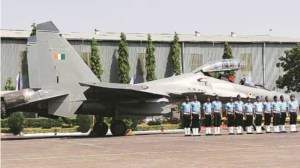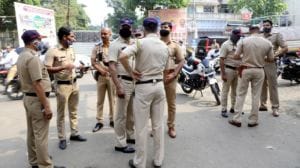Queue, sera, sera
It was while waiting at the Moscow airport some years back that realisation dawned. India, like Russia, has experienced its own economic rev...

It was while waiting at the Moscow airport some years back that realisation dawned. India, like Russia, has experienced its own economic revolution, even if ours has been less dramatic and more gradual. The serpentine queue at the Moscow immigration counter stretched on endlessly. As in India the officious man at the immigration counter scrutinised each passport photograph at his own leisurely pace. The burly airhostess at the transit lounge was frantically announcing that our plane to Prague was ready to depart, but we were stuck in the middle of a sea of humanity with prospects of catching the flight fast diminishing.
One of my companions muttered disgustedly in Hindi, ‘‘These people have nothing but sawdust in their brains. For eighty years they have been standing in bread lines and they can’t kick the habit even now.’’ A voice behind us countered in chaste Hindi, ‘‘That’s unfair. I have seen equally long queues in Delhi.’’ He was a Russian engineer who had spent many years working at a hydel power project in north India and was therefore quite familiar with the reality of asli Bharat.
Standing in line was once an integral part of our daily lives. Fortunately, it is a handicap which our younger generation no longer has to deal with. Thirty years ago when I came to Delhi for my first job, it was the high noon of the Licence-Quota Raj. There were quotas for just about everything, and all manner of shortages. Our economic planners in their wisdom had decreed that only a favoured few were entitled to licences to produce and that too in limited quantities. Our socialist pretensions meant that the state was both the biggest supplier of goods and services and also the most tardy in fulfilling targets and meeting rising demand.
In the early seventies there was an average waiting period of three to five years for a new telephone connection, sometimes it took over seven years. A cooking gas connection took more than a year after registration. (If I never became an accomplished chef, blame it partly on the fact that my first cooking lessons were wasted simply trying to master the intricacies of handling a kerosene stove). Even government processed milk was in such short supply that the Delhi Milk Scheme had stopped issuing new cards. Fisticuffs and arguments broke out every other day at the neighbourhood milk booth.
HMT was the only manufacturer of watches then and every time a fresh supply arrived from the headquarters in the south, it was snapped up so fast that many in the queue returned empty handed. The watches were sold under the counter before the sales outlet even opened and MPs had special watch quotas. If you wanted a car, the choice was limited to a Fiat which had a problem starting on cold wintry mornings or a clumsy looking Ambassador, a model so old fashioned that it had been discarded in the rest of the world. The waiting period for a new Bajaj scooter could be nearly a decade; inevitably the price of a second-hand two-wheeler was much higher than the original controlled price. In fact journalists, bureaucrats and politicians who got their permits every three years for buying new cars or scooters paid for the vehicle from the proceeds of the old one and were left with some spare cash to celebrate their new acquisition.
When constructing a house half your time and energy was spent trying to arrange a regular supply of cement, which was rationed. As a rookie in the profession, I was initially puzzled why the reporter covering the Delhi administration was constantly accosted by the peons and press workers in the office who beseechingly passed him little chits. The chits were for the release of cement bags. One of the key duties of the reporter covering the Delhi government was to get the chits signed by the executive councillor for civil supplies, who at his press conferences spent most of his time signing cement bag chits.
In those days sugar was on the ration card as were kerosene, rice and even candles. The ration shop owner was the most important person in the local market. If you fell foul of him — as I did by foolishly writing a letter of complaint against him for atrocious service and insolent manners — he could make you run around in circles, simply claiming that he had run out of stocks every time you made a trip to his shop. (I later learned that he funded the local party in power and hence could not be touched.)
For someone of my vintage, every fresh instance of the efficiency of today’s open economy with its vibrant competition, in sharp contrast with the restrictive regulations and monopoly dispensations of the past, seems like a minor miracle. After putting up for decades with the whims of MTNL functionaries, imagine my astonishment last fortnight to find a smart Air Tel salesman offering to install a new telephone in 24 hours and giving me a choice of instrument and even asking me to choose the colour. (Though admittedly I have a sneaking suspicion that the rapid decline in MTNL telephones this monsoon in Delhi may have been inspired to some extent by the competition.)
It is heartening to learn that there are no takers for some of the Delhi Development Authority’s shabbily constructed new apartments. There was a time when you grabbed without question whatever was offered by way of a house since any fuss could leave you without a roof over your head for years together. The DDA had a virtual monopoly for dispensing middle and lower income apartments in Delhi.
Some months back the sight of depressingly long queues of three-wheelers waiting to refill their CNG cylinders revived uncomfortable memories of the past. But even these queues seem to have vanished, belying the prophets of doom and gloom who claimed that the demand for CNG could not be met and it was folly to insist on environmentally friendly fuel. The beauty of a free market economy is that if there is a demand there is always someone enterprising enough to meet it.






- 01
- 02
- 03
- 04
- 05

























